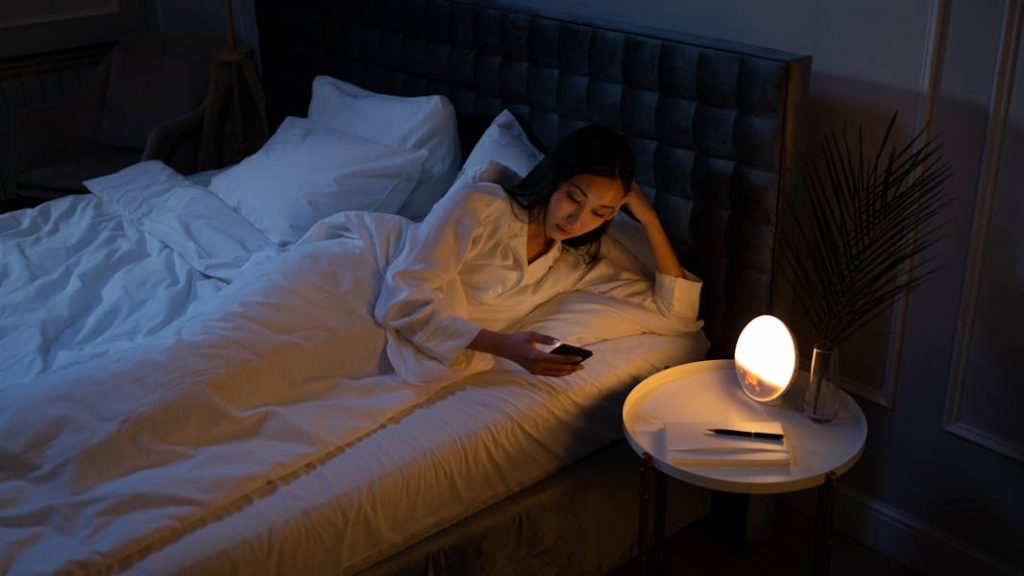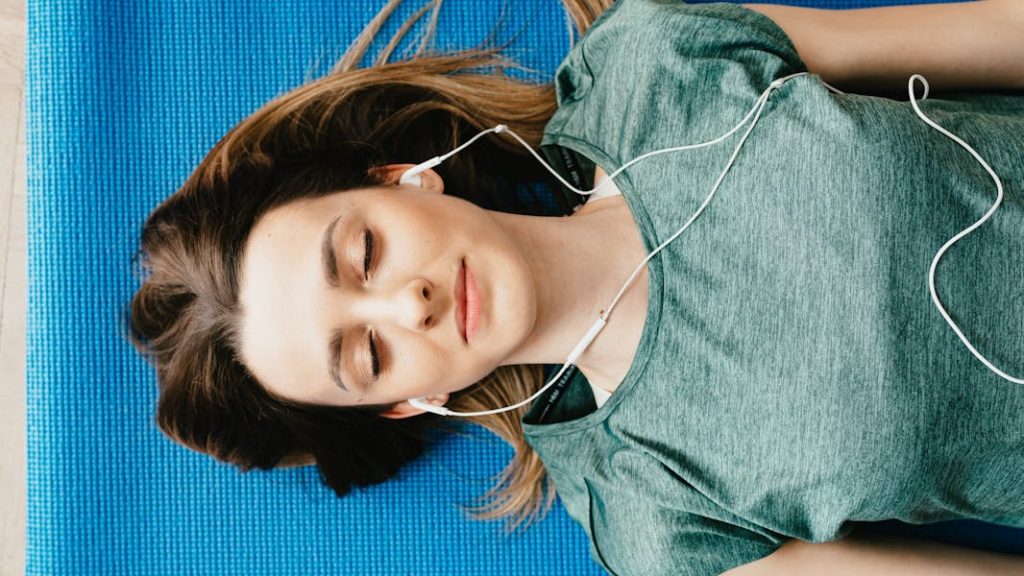If you’re someone who struggles with anxiety at night, you’ve likely experienced restless hours of staring at the ceiling, your mind racing with worries. You’re not alone—nighttime anxiety is a common issue that affects many people. But why does anxiety often feel worse at night? In this blog post, we’ll explore the causes of anxiety worsening at night, how it impacts your sleep, and most importantly, practical tips to help you manage anxiety at night.

Why Does Anxiety Get Worse at Night?
1. Lack of Distractions Makes Anxiety More Noticeable
During the day, various activities like work, family responsibilities, and social interactions keep your mind more occupied. However, when night falls and the world quiets down, your brain has fewer distractions, which makes anxious thoughts and worries more noticeable. Mental anxiety tends to surface during light sleep or when you’re attempting to relax, making it harder to drift off.
2. Hormonal Changes and Cortisol Spikes
Your body’s natural hormone cycles can also contribute to anxiety at night. Cortisol, a stress hormone, typically decreases in the evening to help you relax. However, if you’re already stressed or anxious, your cortisol levels may remain elevated, which increases nighttime anxiety and disrupts sleep. Additionally, melatonin, the hormone that helps you fall asleep, may be suppressed, making it even harder to calm down.

3. Fear of Not Sleeping—The Anxious-Sleep Cycle
For many people, anxiety about not being able to sleep creates a vicious cycle. You’re anxious because you can’t fall asleep, and that anxiety makes it even harder to sleep. This type of sleep anxiety is very common. It’s a form of tension-based anxiety where your mind and body can’t transition from light sleep to deep sleep due to the worry and nervous energy.
4. Unresolved Emotions Coming to the Surface
During the day, you might put aside emotions like stress, anger, or sadness to focus on completing your daily tasks. At night, when there’s nothing to distract you, these unresolved emotions resurface, leading to heightened anxiety. Whether it’s something that happened earlier in the day or long-standing worries, nighttime can bring these emotions to the forefront, impacting your ability to relax and sleep.

How Nighttime Anxiety Affects Sleep
Anxiety and sleep problems go hand in hand. Anxiety can make it difficult to fall asleep, stay asleep, or get restful, unbroken sleep. Research shows that sleep deprivation can exacerbate anxiety, creating a negative feedback loop. Lack of restorative sleep increases stress and anxiety, which in turn makes it harder to sleep, leaving you feeling more anxious and sleep-deprived.
Short-Term Strategies to Reduce Nighttime Anxiety
If you’re struggling with anxiety at night, here are some short-term strategies to help calm your mind and body, making it easier to fall asleep.
1. Breathing Exercises for Anxiety
One of the simplest and most effective ways to manage anxiety at night is to focus on your breathing. Try this simple technique, take a deep breath in for four seconds, then slowly out for four seconds, focusing on the counting. This helps slow your heart rate and calm your nervous system, reducing nighttime anxiety. Give this technique a few minutes and notice how you feel.
2. Progressive Muscle Relaxation (PMR)
Progressive Muscle Relaxation (PMR) is a great way to release physical tension that can contribute to anxiety. Start by tensing a muscle group (like your feet) for five seconds, then release for ten seconds. Repeat this throughout your body. This technique helps your body relax, which in turn calms your mind and reduces sleep anxiety. Listen to my Progressive Body Relaxation technique for free.

3. Establish a Calming Night Routine
A consistent sleep routine signals to your body that it’s time to wind down, which can help reduce anxiety at bedtime. This could involve activities like reading, journaling, or taking a warm bath. Be sure to avoid screens for at least an hour before bed, as the blue light from phones and computers can interfere with melatonin production, making anxiety worse.
4. Mindful Distraction Techniques
Sometimes, the best way to combat nighttime anxiety is to gently distract yourself. You can focus on calming images, like picturing yourself in a peaceful place (a beach or forest), or use guided meditation apps to help quiet your mind. I recommend visualizing something positive or reflecting on a small achievement from your day to shift your focus away from anxious thoughts. Here’s a free track to help you ‘Relax and Let Go of Daily Stress‘.

Long-Term Solutions for Nighttime Anxiety
Addressing the root cause of nighttime anxiety is key to long-term relief. Here are some strategies that can help reduce anxiety over time.
1. Cognitive Behavioral Therapy (CBT)
Cognitive Behavioral Therapy (CBT) is an evidence-based approach that helps you identify and change negative thought patterns. It’s especially helpful for those who experience catastrophic thinking at night—like worrying excessively about the consequences of not getting enough sleep. CBT can help you break the anxiety-sleep cycle.
2. Regular Exercise
Regular exercise is one of the most effective ways to reduce anxiety and improve sleep. Exercise releases endorphins, which are natural mood boosters, and helps tire the body, making it easier to fall asleep. Aim for at least 30 minutes of moderate activity most days, but avoid vigorous exercise close to bedtime.
3. Reduce Caffeine and Alcohol
Caffeine is a known stimulant that can worsen anxiety at night, especially if consumed in the afternoon or evening. Alcohol may initially make you feel relaxed, but it can disrupt your sleep cycle, leading to nighttime waking and increased anxiety. Limiting both can improve your sleep quality and reduce nighttime anxiety.
4. Mindfulness and Meditation
Mindfulness practices have been shown to significantly reduce anxiety and improve sleep. Regular meditation helps you stay present, letting go of worries about the future or the past. Even five to ten minutes of meditation before bed can help ease anxiety at bedtime and create a sense of calm. Listen to my ‘Overthinking Before Bedtime’ meditation track for free.

When to Seek Professional Help
If your nighttime anxiety is severely affecting your life, it may be time to seek professional help. Anxiety disorders are highly treatable, and I can work with you to develop a personalized plan for managing your symptoms. I actually have an Anxiety Benchmark Test that you can take to allow you to understand you own anxiety levels.
Schedule a Free Consultation
If you’re struggling with anxiety at night and would like more tailored advice, I offer a free online consultation where we can discuss your specific challenges. Together, we can create a personalized strategy to help you manage your anxiety and improve your sleep.
Remember: You don’t have to suffer from nighttime anxiety alone. With the right tools and support, you can reclaim your nights and get the restful sleep you deserve.
Interested in learning more? Contact me today to arrange your free consultation and start your journey toward better sleep and less anxiety.
